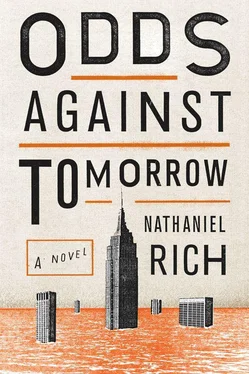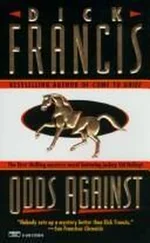“It’s east of Flatbush Avenue, west of Ralph,” said Hank. “Near Mill Basin and the Belt Parkway, protected by the Rockaways from the sea. No subways go there. It was working class — mostly West Indians and Orthodox Jews. Now it’s a giant patch of dirt. You can bet the government won’t be rehabilitating it anytime soon.”
“It’s cold,” Jane whispered in Mitchell’s ear. “Can we go?”
“One second,” said Mitchell. “Let’s hear him out.”
“When’s this supposed to happen?” someone said.
“Tomorrow night,” said Hank. “We meet at the far end of the tennis courts. I’ll bring flashlights. But we don’t turn them on until we’re over Hell Gate.”
The only sound was the river slapping playfully against the rocks.
“Any other questions?”
“Yeah,” said one woman. “Why are you in charge?”
“You got a better idea, pop it.”
They waited.
“I’ll see you tomorrow midnight. Don’t let the word out. We don’t know who’s watching.”
Mitchell and Jane separated from the others and walked quickly back to their trailer.
“Who could be watching us?” said Jane after they were out of earshot. “He’s not just paranoid. He’s delusional.”
“Paranoia has its advantages. Did you see his arms?”
“Yeah. That dude is a piece of meat.”
The smell engulfed them as soon as they entered the trailer, a sour, moldering, damp animal rot — the smell of despair.
“It’s intolerable,” said Mitchell.
“I know. I’d open the windows, but then we lose the AC. Lose-lose.” She cracked open a can of water and took a swig. “We have to get out of here. But we have to be smart about it.”
“Mm.”
“You’re thinking about going,” she said. “You’re actually thinking about leaving tomorrow. With Korean G.I. Joe.”
“The man is Chinese.”
“What about me?”
“We go together.”
“And Future Days?”
“The FEMA people say it’ll be at least a week until the city opens. That’s optimistic. We have time.” He watched for her reaction. She didn’t react. “We can’t stay here.”
“Look, I don’t feel safe here either. But it’s better than the Flatlands.”
There was more to it, of course. It wasn’t only fear for their safety that made the Flatlands seem like a promising alternative. Unless he had some time to concentrate, in solitude, and consider everything that had happened, he wouldn’t be able to figure out the next thing, the big thing to which FutureWorld, Tammy, and even Ticonderoga were inexorably leading him. And there had to be something else, didn’t there? For if not, what had all this been for?
“You saw the way they went after me yesterday,” said Mitchell. “They wanted to kill me. If it weren’t for Hank Cho, what do you think would have happened?”
“I realize. But casting out into the unknown? It’s just so not like you.”
“I’m not like me anymore.”
There had to be a big, perfect thing right ahead, some pursuit more vast and profound than fear prediction. Now that his old way of life was gone, nothing remained. He was as bare as the floodgrounds. So there had to be something larger up ahead, because if not, then the only thing was destruction and chaos—
“So you would just leave me here,” said Jane. She looked frantically around the trailer: the stained cabinets, the wilted, understuffed polyester couch, the linoleum floor that curled up at the edges like a piece of burning paper.
“Of course not. I’m just saying the guy’s plan is worth some thought.”
Jane went into the bedroom. Out flew a pillow, then the extra blanket.
“You can think about the plan all you want,” she said, “over there.” She pointed to the couch.
The door closed, then locked.
He switched off the overhead fluorescent panel and spread the moth-bitten blanket over his body. That was Jane for you. Determined, devoted, never casual. She demanded full devotion in return. And she deserved it. But could he give it to her?
He had a picture of Jane carefully wiping the soot off his face outside the infirmary at Ticonderoga, cradling his head in her trembling hands. He blocked it out. He turned on the couch and tried to hit the cushions into softness, but nothing worked, and then an uncomfortable sensation covered him like a heavy woolen blanket and he couldn’t escape from under it. For the first time he could remember, he was making a plainly irrational decision. Jane’s logic was sound. Futurism, as she’d put it on Herman Loaiza’s bus, was the way of the future. After Tammy, the risk market would be at peak demand. It was important to establish Future Days immediately. Futurism was now a job for specialists, but it wouldn’t be much longer. A few more years of these new meteorological patterns, a few more disasters, and every person on the street would be able to speak intelligently about drought, methane pollution, UV poisoning. The intricacies of planetary collapse would be general knowledge. Kid stuff. So Jane had every reason to act with urgency. And Mitchell had every reason to join her.
What was the alternative? Elsa’s Ticonderoga dream of a self-sustaining farm, toxin-free food, the creation of so much natural energy that the surfeit could electrify the rest of the county? Sure, all that was noble, that was fine. Elsa had been a kind of futurist herself, her behavior driven by her fear about what was happening to the planet — and to herself. But Mitchell had been in finance too long to lose sight of the truth about Ticonderoga. What, after all, was its source of income? Billy’s father’s money. That wasn’t a business model. It was a charity, financed by good intentions. This put Ticonderoga squarely on the wrong side of history. It was a local, virtuous, and limited enterprise. The Nybusters of the universe would never invest in a Ticonderoga. They wanted to be insulated from transformational change. That’s why Future Days was the present, if not also the future. The question was whether it was Mitchell’s future.
He realized that he was pacing around the room. He reached into the refrigerator for a water. As he popped the can, he heard a knocking behind him. So — Jane had reconsidered.
“Jane?” he said. “Should I come in?”
“That wasn’t me,” Jane called out from inside the bedroom.
There was more knocking. The trailer rattled. He went to the front door. Marcy Rosado was back, with her child. This time she had brought twenty-five people.
“Mr. Prophet,” said Marcy. She was rocking the baby on her shoulder to the erratic rhythm of her own agitation. Her teeth were bared. “Is now a good time?”
8.
What would Tibor do? A ludicrous question under normal circumstances, but here was one situation in which the experiences of father and son overlapped. A city destroyed, and nowhere to go. What would he do? Tibor would flee, as he had Budapest in the winter of 1956, hiding under a tarp in the bed of an apple truck until it reached Nickelsdorf, on the other side of the Austrian border. Rikki? She’d be halfway to Kansas City by now. She could take better care of herself than any government agency, thank you very much. And Elsa? Saint Elsa of the Fields? That was easiest of all. She’d be gone already — lost in the urban wilderness. It seemed to be Elsa’s preferred state, lost in the wilderness. The wilderness of idealism, the wilderness of Maine, the wilderness of unconsciousness. Wherever she might be, she was lost.
But Jane Eppler was the only person who counted now. And her feelings on the subject were a tad more nuanced.
“You’ve gone fucking in- sane .”
She was foaming at the mouth. She had stepped out of the bathroom while brushing her teeth and the toothpaste foam was spilling down her chin. She caught it with her free hand and dodged back into the bathroom cubicle. Mitchell sat up on the couch and checked the clock. It was seven in the morning. It occurred to him that he had never heard Jane curse before.
Читать дальше












